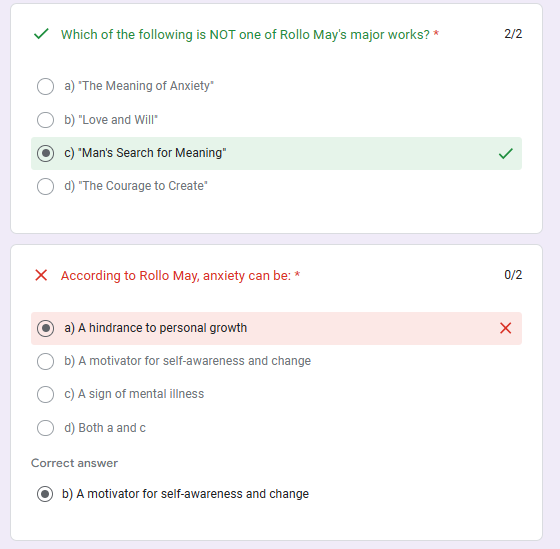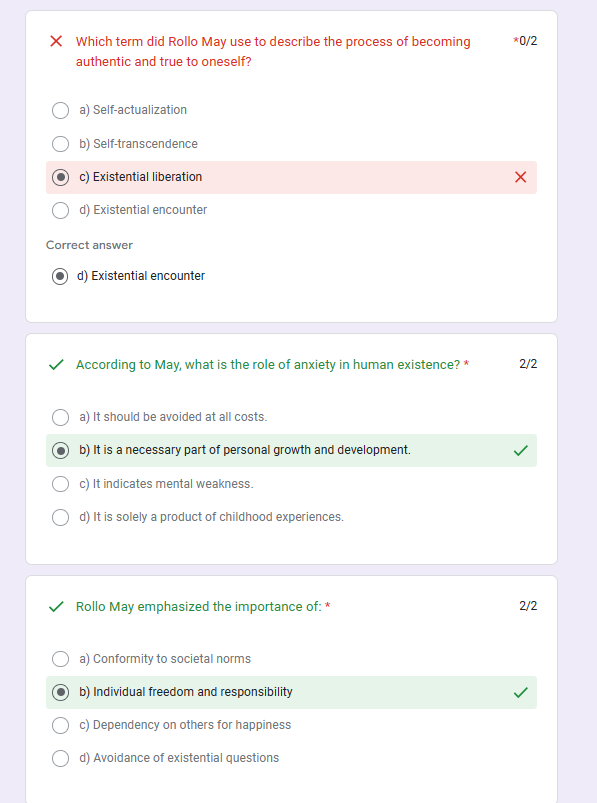rollo may; existential psychology
The basic assumption
Existence precedes Essence
Existence - Being
suggests process (refers to a product)
associated with growth and change (signifies stagnation and finality
Becoming Essence - Static; Immutable Property
Being-in-the-world - oneness of subject and object, of person and world
Dasein - Being in the world, to exist in the world
Umwelt - in relation to the world/nature
Mitwelt - in relation to other people
Eigenwelt - in relation to ourself
Nonbeing - nothingness
the fear of death or nonbeing often provokes us to live defensively and to receive less from life than if we would confront the issue of our nonexistence
“we are afraid of nonbeing and so we shrivel up our being”
Anxiety
Normal Anxiety
Which is proportionate to the threat, does not involve repression, and can be confronted constructively on the conscious level
Neurotic Anxiety
A reaction which is disproportionate to the threat, involves repression and other forms of intrapsychic conflict, and is managed by various kinds of blocking-off of activity and awareness
Forms of Love (4)
1. Sex
a biological function tied to both procreation and pleasure, as well as anxiety.
In ancient times, sex was viewed as natural, akin to eating and sleeping.
Victorian society suppressed sexual feelings and discussions, considering them taboo.
The 1920s saw a cultural shift towards openness about sex, leading to preoccupation with it.
Society transitioned from sexual guilt to anxiety about not engaging in sexual activity.
sex is more focused on physical pleasure and manipulation of organs.
2. Eros
involves making love and establishing enduring connections
transcends techniques and rules, driven by human imagination.
characterized by care, tenderness, and the longing for a lasting union that enriches both partners.
is seen as essential for the survival of the human species, serving as the salvation of sex.
3. Philia
seen as the salvation of sex
refers to an intimate nonsexual friendship between individuals.
requires time to grow and develop, akin to the slowly evolving love between siblings or lifelong friends.
It emphasizes acceptance, companionship, and enjoyment of the other person without the need for specific actions.
According to Harry Stack Sullivan, preadolescence is crucial for developing chumship or philia, which is essential for healthy erotic relationships in early and late adolescence.
4.Agape
defined as an altruistic love characterized by esteem for the other person's welfare beyond any personal gain.
It is disinterested and unconditional, ex. the love of God for humanity..
Healthy adult relationships encompass all four forms of love: sexual satisfaction, desire for enduring union, genuine friendship, and unselfish concern for the other's welfare.
Authentic love requires self-affirmation, tenderness, affirmation of the other, relaxation of competition, self-abnegation when necessary, and virtues like mercy and forgiveness.
Freedom and Destiny
Freedom
individual's capacity to recognize their determinism or destiny.
Determinism in this context = understanding factors such as death, gender, inherent weaknesses, and childhood experiences that shape behavior.
Freedom arises from the awareness of these factors and the possibility of change, even when the specific changes are unclear.
It involves holding different possibilities in mind and being open to various courses of action.
This condition may lead to increased anxiety, but it is considered normal and manageable for healthy individuals.
Forms of Freedom
a. Existential Freedom
is not just about philosophy. It's about the freedom to act.
ex. Many middle-class Americans have it—they can travel, choose friends, vote, and shop. It's about having the power to act on your choices.
b. Essential Freedom
Freedom of being, is not necessarily dependent on the freedom to act.
Even in situations of physical confinement, individuals can experience a sense of inner freedom when they confront their destiny.
Destiny
is not predetermined but rather our destination, within which we have the power to choose and confront challenges. Although we can't change our destiny entirely, we can choose how to respond to it and live out our talents. May emphasizes that freedom and destiny are intertwined; one cannot exist without the other.
Psychopathology
The study of mental disorders and unusual or maladaptive behaviors.
all about understanding why people might think, feel, or behave in unusual or distressing ways.
apathy and emptiness - not anxiety and guilt - are the malaise of modern times
people become directionless when they ignore their aspirations or give up they lose purpose and become directionless
a person without a goal can turn to self-destructive behaviors
feeling of being insignificant in a world that increasingly dehumanizes a person can lead to apathy
*May saw psychopathology as a lack of communication—the inability to know
others and to share oneself with them. Psychologically disturbed individuals deny
their destinies and thus lose their freedom. They erect a variety of neurotic symptoms, not to regain their freedom, but to renounce it. Symptoms narrow the person’s phenomenological world to the size that makes coping easier.
May wrote extensively on the subject, rejecting the idea that psychotherapy should reduce anxiety and ease feelings of guilt. Instead, he suggested that psychotherapy should make people more human: that is, to help them expand their consciousness so that they will be in a better position to make choices (M. H. Hall, 1967). These choices, then, lead to the simultaneous growth of freedom and responsibility.
May believed that the purpose of psychotherapy is to set people free. He argued that therapists who concentrate on a patient’s symptoms are missing the more important picture.
May insisted that psychotherapy must be concerned with helping people experience their existence, and that relieving symptoms is merely a by-product of that experience.
RELATED RESEARCH
May’s existential theory is a method of psychotherapy. (No direct empirical research)
The critical stance that May adopted toward objective and quantitative measurement. Any theory that emphasizes the connection between subject and object and the uniqueness of each individual will not be conducive to large sample research with experimental or questionnaire design. May argued that modern science is too rationalistic, too objective
Existential anxiety, anxiety as “the apprehension cued off by a threat to some value which the individual holds essential to his [or her] existence as a self". The strongest among the threats to our existence is death.
May and Yalom (1989) argued the major developmental task is terror of obliteration, in which life is the process of coping with and confronting death.
“Terror management” a modern experimental offshoot of existential psychology. American psychiatrist Ernest Becker made basic argument of these existentialists (as well as writers such as Camus and Sartre) is that humans are first and foremost motivated by fear of death. Moreover, many of these thinkers see human creativity, culture, and meaning as unconscious defenses against mortality.
Threats in the Umwelt: Mortality Salience and Denial of Our Animal Nature To be “cultured” is to be in complete control of the biological nature of being human. According to terror management theorists, the denial of our bodily and animalistic nature stems from the existential fear of death and decay of our bodies. As Sheldon Solomon and colleagues put it, “humans could not function with equanimity if they believed they were not inherently more significant than another animals."
Culture is the mechanism through which awareness of death is regulated, a type of self-esteem function to defend against thoughts of death. Anything that reminds us of our animal nature, and ultimately of death, is responded to with a strong sense of disgust.
Finding Meaning in the Mitwelt: Attachment and Close Relationships
People’s attachments to others in close relationships serve a terror management function. Studies have also reversed the relationship between death awareness and attachment-seeking and have found that if people imagine a separation from a romantic loved one, this increases the accessibility of death-related thoughts in their minds.
Growth in the Eigenwelt: There Is an Upside to Mortality Awareness Terror management theory is focused almost exclusively on what May would call the “neurotic anxiety” engendered by mortality awareness. May (1958a) argued that a courageous facing of the inevitability of our death enables us to rise above a defensive, conformist existence to Dasein.
Critique of May
Existentialism in general and May’s psychology in particular have been criticized as being anti-intellectual and antitheoretical. May acknowledged the claim that his views did not conform to the traditional concept of theory. He pointed to the sterility of conventional scientific methods and their inability to unlock the ontological character
Concept of Humanity
People are complex, capable of good and bad. Society makes us lose touch with nature and ourselves. We can still make choices within limits set by fate. Making choices can be scary but important. May sees hope for humanity's renewal. He believes we shape our destiny through choices. Being aware and brave is key to facing challenges. Knowing ourselves helps us make better choices. Our personalities are shaped by both society and biology. Each person is unique, shaping their own path within destiny.

